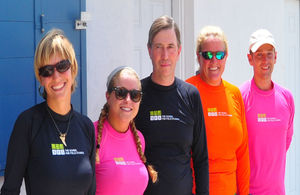TCI governor visits South Caicos centre of marine science excellence
Scientists researching how to sustainably manage marine environments and local economies present findings to Governor Ric Todd.

Governor Ric Todd (centre) joins the staff and students at the School for Field Studies Centre for Marine Resource Studies.
Turks and Caicos Islands (TCI) Governor Ric Todd joined some of the researchers at the internationally renowned School for Field Studies’ Centre for Marine Resource Studies (SFS-CMRS) in visiting two of TCI’s 34 protected areas, the Admiral Cockburn Land and Sea National Park reefs. These protected areas were established to ensure the sustainability of natural and historic resources in the Territory.
He heard how the SFS-CMRS is engaged in a five year research programme to improve scientific knowledge, local understanding and the environmental stewardship of the TCI’s natural resources and to improve the effectiveness of its protected areas.
The SFS is looking at how to balance the protection the ecology of South Caicos while ensuring its economic development: how to best manage an influx of workers and visitors, the impact that this has on the marine environment, and even how to manage increased consumption of conch, lobster and reef fish, for example.
Established on TCI since 1990, nearly 150 overseas students make use of the SFS-CMRS facility across its two semesters and additional summer programmes each year.
“Our pristine marine environment clearly supports the TCI’s economy through tourism and fisheries,” said Governor Todd. “It is vital to our Islands’ long term prosperity, for residents and visitors alike.
“We must all play our part in protecting the diversity and health of our coastal and ocean habitats, which includes mangrove, seagrass, coral reef, sand banks, and the ready access to deep ocean here on South Caicos that brings in so many tourist during the whale migration season. The valuable research of the SFS is essential to our knowledge of how to best do achieve this.
“Clearly, the 40-plus students and staff of the SFS-CMRS also provide a valuable economic stimulus to the local economy, as well as getting involved in community projects across South Caicos.”
“Our work here is to provide the TCI Government with scientific evidence that they can use as the basis for its future policies and plans,” said Heidi Hertler, Ph.D., Centre Director, SFS-CMRS, South Caicos. “In addition, our researchers contribute to understanding of these issues by contributing to international peer-reviewed scientific journals. In this regard, the TCI is a globally important ecological resource.”
SFS creates study abroad experiences through field-based learning and research. Its educational programmes explore the human and ecological dimensions of the complex environmental problems faced by local people across the world, contributing to sustainable solutions in these places. The SFS community is part of a growing network of individuals and institutions committed to environmental stewardship.
The School for Field Studies began when a group met in Boston in October 1980 to establish an educational organization to address these needs. In the summer of 1981 it sent its first 75 students into the field. Over the years programs operated in a total of 20 countries and 15 states and semester-length programs were introduced; by 1995 the School had moved entirely to programmes based entirely in the field.
Today SFS is known throughout the United States as the premier environmental study abroad program for undergraduates. Over 80 colleges and universities are affiliated with SFS and more than 15,000 students from the US and abroad have participated in its programs. SFS now has permanent, fully-staffed field stations in Australia, Costa Rica, Kenya, Tanzania, and the Turks & Caicos Islands. Its faculty and directors maintain close research relationships with the communities in which it is located.
Get more information from the School for Field Studies on the work in South Caicos.